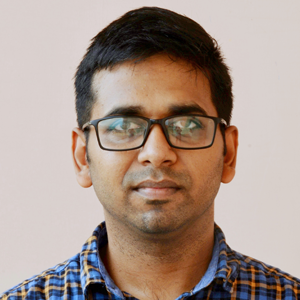 Bhuvnesh Bharti is an Anding Endowed Associate Professor in the Cain Department of Chemical Engineering at Louisiana State University. He received his B.S. (Hons. School) and M.S. (Hons. School) from Panjab University Chandigarh, India. He obtained his PhD at Technische Universität Berlin, Germany in 2012, which was followed by postdoctoral research at Shinshu University and North Carolina State University. Bhuvnesh is the recipient of several awards including Springer Theses Award (2014), NSF-CAREER Award (2020) and LSU Rising Faculty Research Award (2021). His research group investigates structure-property-function relationships in colloidal dispersions and develops methodologies to program their equilibrium and non-equilibrium behaviours. His present research interests include active colloids, directed assembly, and fundamental investigations on environmental colloidal pollutants such as microplastics.
Bhuvnesh Bharti is an Anding Endowed Associate Professor in the Cain Department of Chemical Engineering at Louisiana State University. He received his B.S. (Hons. School) and M.S. (Hons. School) from Panjab University Chandigarh, India. He obtained his PhD at Technische Universität Berlin, Germany in 2012, which was followed by postdoctoral research at Shinshu University and North Carolina State University. Bhuvnesh is the recipient of several awards including Springer Theses Award (2014), NSF-CAREER Award (2020) and LSU Rising Faculty Research Award (2021). His research group investigates structure-property-function relationships in colloidal dispersions and develops methodologies to program their equilibrium and non-equilibrium behaviours. His present research interests include active colloids, directed assembly, and fundamental investigations on environmental colloidal pollutants such as microplastics.
Find more about his work via:
Group website: https://faculty.lsu.edu/bbhartigroup/index.php
LinkedIn: www.linkedin.com/in/b-bharti
Read Bhuvnesh Bharti’s Emerging Investigator article: http://xlink.rsc.org/?doi=10.1039/D3SM00354J
How do you feel about Soft Matter as a place to publish research on this topic?
We are always excited to submit our work to Soft Matter. It is a reputable, and well-established avenue for publishing our research. With its wide readership invested in soft matter science and related disciplines, it offers an invaluable platform to maximize the visibility and impact of our work. I believe that Soft Matter plays an important role in advancing the field as a whole by providing us a platform to contribute to the collective understanding of soft materials and their properties.
What aspect of your work are you most excited about at the moment and what do you find most challenging about your research?
Currently, one of the major thrusts in our research group is on investigating the behaviour of colloids driven by external electric and magnetic fields. We believe that field-driven colloidal matter occupies an intriguing intersection between traditional synthetic materials and the dynamic machinery found in out-of-equilibrium biological systems. The ability to energize colloidal particles using external fields provides an opportunity to uncover the fundamental principles underlying the assembly and functionality of biomaterials. This knowledge can be harnessed to design functional materials with customizable physicochemical properties. However, the research area of field-driven colloids presents several challenges that require attention to achieve a comprehensive understanding of these systems. Key among these challenges, from my perspective, is the precise control of colloidal structure and dynamics in three-dimensional space, as well as predicting their complex behaviours and emergent properties. Additionally, practical applications necessitate addressing scalability, robustness, and controlled responses in complex environments. Successfully tackling these challenges will advance our understanding of field-driven colloids and unlock their potential applications.
In your opinion, what are the most important questions to be asked/answered in this field of research?
In our opinion, the single most important question that needs to be addressed in the area of field-driven colloids is: “What are the mechanisms and principles governing the dynamic self-assembly and collective behaviour of field-driven colloidal particles in three-dimensional space?” This question goes beyond surface-level understanding and dives into the intricate processes that dictate how external fields influence the motion, assembly, and interactions of colloidal particles in complex 3D environments. To answer this question, our ongoing research focuses on investigating the intricate interplay between external fields and colloidal dispersions, seeking to unravel the underlying mechanisms that govern their structure and dynamics. We are also exploring the complex interactions between particles themselves, as well as their interactions with the applied field, considering factors such as particle shape, size, and surface properties. By addressing these challenges and gaining a deeper understanding of the principles at play in 3D space, we aim to unlock the full potential of field-driven colloids and open up exciting possibilities for transformative applications in various scientific and technological domains.
Can you share one piece of career-related advice or wisdom with other early career scientists?
Starting an independent research career and establishing a research lab can be intimidating. In my opinion, it’s crucial to prioritize sustainability in our scientific careers. This means focusing not only on research but also educating and mentoring young minds along with maintaining a healthy work-life balance. A successful research career involves more than publishing articles and securing grants—it also encompasses mentoring, graduate student training, and education. While achieving work-life balance is challenging, it’s essential to make an effort to maintain this equilibrium for the well-being of yourself and your loved ones.












